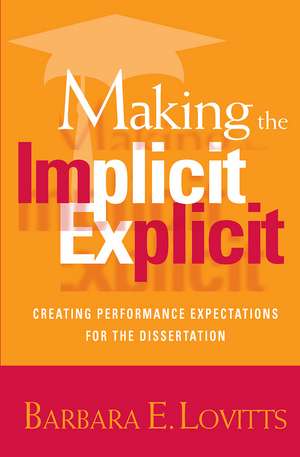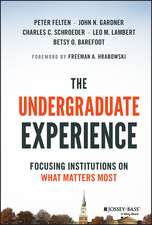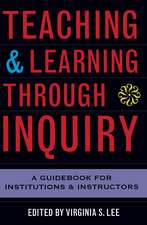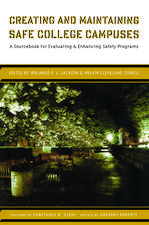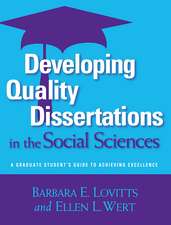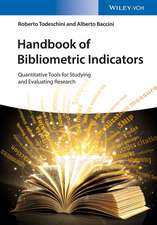Making the Implicit Explicit: Creating Performance Expectations for the Dissertation
Autor Barbara E. Lovittsen Limba Engleză Paperback – 8 mar 2007
Preț: 270.36 lei
Nou
Puncte Express: 406
Preț estimativ în valută:
51.74€ • 53.71$ • 43.14£
51.74€ • 53.71$ • 43.14£
Carte tipărită la comandă
Livrare economică 22 martie-05 aprilie
Preluare comenzi: 021 569.72.76
Specificații
ISBN-13: 9781579221812
ISBN-10: 1579221815
Pagini: 428
Dimensiuni: 152 x 229 x 22 mm
Greutate: 0.59 kg
Ediția:1
Editura: Taylor & Francis
Colecția Routledge
Locul publicării:Oxford, United Kingdom
ISBN-10: 1579221815
Pagini: 428
Dimensiuni: 152 x 229 x 22 mm
Greutate: 0.59 kg
Ediția:1
Editura: Taylor & Francis
Colecția Routledge
Locul publicării:Oxford, United Kingdom
Public țintă
PostgraduateCuprins
List Of Tables; Preface; Acknowledgments; Part One. The Dissertation And Its Assessment 1. Judging Dissertations; 2. Achieving Excellence ; 3. Universal Qualities Of A Dissertation ; 4. Disciplinary Approaches To Doctoral Training And The Development Of A Dissertation ; 5. Converting Performance Expectations Into Rubrics ; 6. Conclusions, Implications, And Recommendations; Part Two. The Disciplines 7. The Biology Dissertation; 8. The Physics Dissertation; 9. The Electrical And Computer Engineering Dissertation; 10. The Mathematics Dissertation; 11. The Economics Dissertation; 12. The Psychology Dissertation; 13. The Sociology Dissertation; 14. The English Dissertation; 15. The History Dissertation; 16. The Philosophy Dissertation; Appendix A. List Of Participating Universities, Dean, Coordinators, And Facilitators; Appendix B. Details On The Study’s Methodology; References; Index; About The Author.
Notă biografică
Barbara E. Lovitts is an independent higher education researcher. She was formerly Senior Program Officer in the Center for the Advancement of Scholarship on Engineering Education at the National Academy of Engineering, and is the author of Leaving the Ivory Tower: The Causes and Consequences of Departure from Doctoral Study. She has worked at the University of Maryland, the American Institutes for Research, the National Science Foundation, and the American Association for the Advancement of Science.
Recenzii
"Lovitts’ important book seeks nothing less than to reform the graduate education process. Focusing on the dissertation, the capstone Ph.D. project which demands that graduate students make an original contribution to their disciplines, Lovitts convincingly states that graduate advisors, faculties, deans, and administrators must develop explicit objective standards and criteria for evaluating dissertations. She argues that explicit objective standards for the dissertation enable graduate advisors and administrators to assess the quality of doctoral education on an individual level as well as programmatically. Objective standards also provide graduate students with the transparent knowledge and explicit learning goals that enable them to achieve success at higher levels. Making the Implicit Explicit is a complex and highly focused work that should be essential reading for all graduate student advisors, faculty, and program administrators."
NACADA Journal
“Perhaps one of the most helpful and enlightening contributions of this book that I found was Chapter 5, ‘designed to encourage thinking about standards and criteria for the dissertation and about the underlying concepts and principles of pedagogy that lead to those ends’. Having identified the generic characteristics of four different quality levels of a dissertation and then identifying the discipline-specific characteristics of the main components of a dissertation Lovitts begins to develop her generic, and then ten discipline-specific, rubrics. The author goes to considerable lengths to describe a rubric and its purpose, how one might develop one and might even evaluate one to ensure ongoing quality and standards.
Lovitts concludes with useful suggestions for how universities and graduate students might use and benefit from having made the implicit explicit or as she says earlier in the book, helping students get past the ‘guess what’s in my mind’ approach to the examination of dissertations.
I found this to be a compelling account of a rigorous research project that has the potential to assist universities, graduate schools and their deans, and dissertation examiners to consider what it is they are seeking in a dissertation and how that can be articulated to research students.”
Reviewed by Margaret Kiley in Studies in Higher Education
"[This book] offers a sound argument for helping doctoral students achieve high performance levels in the research and writing of their dissertation by providing clear and explicit performance expectations.
The author clearly states that providing...explicit expectations should not replace the critical role of the advisor but should enhance the advising relationship between student and faculty member by providing a means for effective formative evaluation. This text is certainly one I wish I had had while writing my own dissertation. In addition to Lovitts' excellent rationales, she gives the reader detailed tables and rubrics that clearly outline the components and characteristics of different quality levels in dissertations.
This book is an excellent resource for graduate students beginning the dissertation phase, for faculty who serve on dissertation committees or as dissertation advisors, and for faculty who may teach dissertation process courses. The text is also a valuable resource for academic departments who may want or need to develop dissertation standards from the ground up or to revamp their existing standards and expectations. The strength of Lovitts' book lies in the practical usefulness of the text...and its functionality for different academic disciplines.
Students and faculty alike will benefit from this practical and useful resource."
The Review of Higher Education
“The culminating achievement of the research doctorate, the dissertation, can be a virtually insurmountable obstacle for graduate students who, having taken on the biggest intellectual challenge of their lives, are mystified about what is expected of them. Barbara Lovitts does much to demonstrate the importance of clearly communicating discipline-based faculty expectations to students who need to understand the purpose, standards, and scope of the dissertation research and writing processes.”
Richard Wheeler, Dean, Graduate College
University of Illinois at Urbana-Champaign
“This is an important piece of work that adds significantly to the national discussion concerning doctoral education by focusing on the dissertation. The book will contribute to the improvement of graduate education by encouraging faculty to talk with their students about standards pertaining to the dissertation, and by helping doctoral students feel more confident about what is always a very demanding part of their graduate experience. Lovitts provides practical strategies useful to department chairs, faculty advisors, and doctoral students.”
Ann E. Austin
Dr. Mildred B. Erickson Professor of Higher, Adult, & Lifelong Education, Michigan State University
“This is a solid and credible work, unlike anything I’ve seen. The empirical part of the study is commendable in scope and depth. It will be both thought- and action-provoking in an arena that needs both. For deans, faculty, and students willing to read it, the book will be stimulating and helpful."
David Leslie, Chancellor Professor, School of Education, College of William and Mary
“What do faculty members look for when evaluating doctoral dissertations? Barbara Lovitts answers this question in Making the Implicit Explicit. Reporting on an extensive study of faculty in 10 disciplines, Lovitts describes standards that cut across disciplines and reveals fascinating discipline-specific considerations regarding doctoral students’ research. Intriguing facts and figures about the history of doctoral education are a plus. For faculty who seek an articulation and analysis of the ‘ineffable’ qualities they routinely evaluate but rarely discuss, this is the book to read! "
Mary E. Huba, Iowa State University
NACADA Journal
“Perhaps one of the most helpful and enlightening contributions of this book that I found was Chapter 5, ‘designed to encourage thinking about standards and criteria for the dissertation and about the underlying concepts and principles of pedagogy that lead to those ends’. Having identified the generic characteristics of four different quality levels of a dissertation and then identifying the discipline-specific characteristics of the main components of a dissertation Lovitts begins to develop her generic, and then ten discipline-specific, rubrics. The author goes to considerable lengths to describe a rubric and its purpose, how one might develop one and might even evaluate one to ensure ongoing quality and standards.
Lovitts concludes with useful suggestions for how universities and graduate students might use and benefit from having made the implicit explicit or as she says earlier in the book, helping students get past the ‘guess what’s in my mind’ approach to the examination of dissertations.
I found this to be a compelling account of a rigorous research project that has the potential to assist universities, graduate schools and their deans, and dissertation examiners to consider what it is they are seeking in a dissertation and how that can be articulated to research students.”
Reviewed by Margaret Kiley in Studies in Higher Education
"[This book] offers a sound argument for helping doctoral students achieve high performance levels in the research and writing of their dissertation by providing clear and explicit performance expectations.
The author clearly states that providing...explicit expectations should not replace the critical role of the advisor but should enhance the advising relationship between student and faculty member by providing a means for effective formative evaluation. This text is certainly one I wish I had had while writing my own dissertation. In addition to Lovitts' excellent rationales, she gives the reader detailed tables and rubrics that clearly outline the components and characteristics of different quality levels in dissertations.
This book is an excellent resource for graduate students beginning the dissertation phase, for faculty who serve on dissertation committees or as dissertation advisors, and for faculty who may teach dissertation process courses. The text is also a valuable resource for academic departments who may want or need to develop dissertation standards from the ground up or to revamp their existing standards and expectations. The strength of Lovitts' book lies in the practical usefulness of the text...and its functionality for different academic disciplines.
Students and faculty alike will benefit from this practical and useful resource."
The Review of Higher Education
“The culminating achievement of the research doctorate, the dissertation, can be a virtually insurmountable obstacle for graduate students who, having taken on the biggest intellectual challenge of their lives, are mystified about what is expected of them. Barbara Lovitts does much to demonstrate the importance of clearly communicating discipline-based faculty expectations to students who need to understand the purpose, standards, and scope of the dissertation research and writing processes.”
Richard Wheeler, Dean, Graduate College
University of Illinois at Urbana-Champaign
“This is an important piece of work that adds significantly to the national discussion concerning doctoral education by focusing on the dissertation. The book will contribute to the improvement of graduate education by encouraging faculty to talk with their students about standards pertaining to the dissertation, and by helping doctoral students feel more confident about what is always a very demanding part of their graduate experience. Lovitts provides practical strategies useful to department chairs, faculty advisors, and doctoral students.”
Ann E. Austin
Dr. Mildred B. Erickson Professor of Higher, Adult, & Lifelong Education, Michigan State University
“This is a solid and credible work, unlike anything I’ve seen. The empirical part of the study is commendable in scope and depth. It will be both thought- and action-provoking in an arena that needs both. For deans, faculty, and students willing to read it, the book will be stimulating and helpful."
David Leslie, Chancellor Professor, School of Education, College of William and Mary
“What do faculty members look for when evaluating doctoral dissertations? Barbara Lovitts answers this question in Making the Implicit Explicit. Reporting on an extensive study of faculty in 10 disciplines, Lovitts describes standards that cut across disciplines and reveals fascinating discipline-specific considerations regarding doctoral students’ research. Intriguing facts and figures about the history of doctoral education are a plus. For faculty who seek an articulation and analysis of the ‘ineffable’ qualities they routinely evaluate but rarely discuss, this is the book to read! "
Mary E. Huba, Iowa State University
Descriere
This book and the groundbreaking study on which it is based is about making explicit to doctoral students the tacit “rules” for the assessment of the final of all final educational products—the dissertation.
